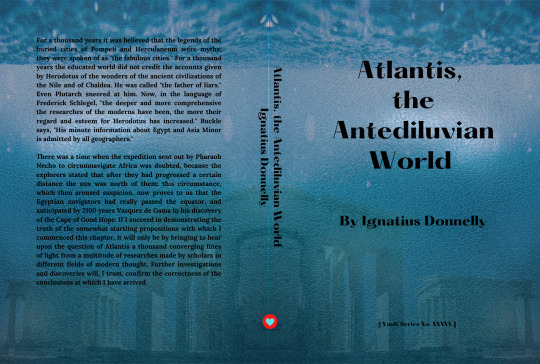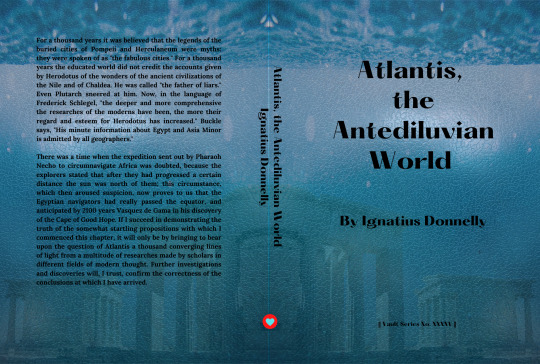#Plato's Dialogues
Explore tagged Tumblr posts
Text
The Philosophy of the Euthyphro Dilemma
The Euthyphro Dilemma, originating from Plato's dialogue "Euthyphro," presents a significant philosophical problem regarding the nature of morality and its relationship to divine command. This dilemma poses a fundamental question about whether moral values are commanded by gods because they are inherently good, or whether they are good because they are commanded by gods. This issue remains relevant in contemporary discussions about the foundations of ethics and the intersection of religion and morality.
The Dilemma Explained
In Plato's dialogue, Socrates encounters Euthyphro, who claims to have a deep understanding of piety and impiety. Socrates asks Euthyphro to define piety, leading to the famous question: "Is the pious loved by the gods because it is pious, or is it pious because it is loved by the gods?"
This question can be reformulated as:
Divine Command Theory: Are moral actions good because they are commanded by the gods?
Moral Realism: Are moral actions commanded by the gods because they are inherently good?
Each horn of the dilemma presents challenges:
If moral actions are good because they are commanded by the gods (Divine Command Theory), then morality appears arbitrary. Anything could be deemed morally right or wrong based solely on divine will, potentially leading to morally questionable commands being seen as good.
If moral actions are commanded by the gods because they are inherently good (Moral Realism), then morality exists independently of the gods. This implies that there is a standard of goodness that even the gods must adhere to, challenging the notion of their omnipotence and moral authority.
Implications of the Euthyphro Dilemma
The Nature of Morality: The dilemma forces a reconsideration of the origins and nature of moral values. If morality is independent of divine command, then ethical principles must be grounded in something other than religious authority, such as reason, human nature, or societal consensus.
Divine Omnipotence and Omnibenevolence: The dilemma raises questions about the attributes of gods, particularly their omnipotence and omnibenevolence. If gods are bound by an external standard of goodness, their power and moral perfection might be seen as limited.
Secular Ethics: The Euthyphro Dilemma supports the development of secular ethical theories that do not rely on divine command. Philosophers such as Immanuel Kant and John Stuart Mill have proposed ethical systems based on reason, human well-being, and utilitarian principles.
Theological Responses: The dilemma has prompted various theological responses. Some theologians argue for a modified Divine Command Theory, suggesting that God's nature is inherently good and that divine commands naturally align with this goodness. Others propose that God's will and moral truths are identical, thus avoiding the arbitrariness problem.
The Euthyphro Dilemma remains a cornerstone in the study of moral philosophy and theology, provoking ongoing debate about the foundations of ethical principles and the role of divine authority in determining what is right and wrong. By challenging both Divine Command Theory and the independence of morality from divine will, the dilemma encourages deeper exploration of the sources and nature of moral values.
#philosophy#epistemology#knowledge#learning#education#chatgpt#metaphysics#Euthyphro Dilemma#Moral Philosophy#Divine Command Theory#Moral Realism#Ethics and Religion#Secular Ethics#Theological Responses#Plato's Dialogues#Foundations of Morality#ethics#morality
2 notes
·
View notes
Text
"Diving into the Abyss: Unraveling the Mysteries of 'Atlantis, the Antediluvian World' by Ignatius Donnelly"

In his timeless work, "Atlantis, the Antediluvian World," Ignatius Donnelly takes readers on an intellectual voyage through the corridors of history, mythology, and speculative science to explore the enigma of Atlantis. Published in 1882, Donnelly's magnum opus continues to captivate minds, challenging conventional beliefs about ancient civilizations and submerged realms.
The title itself sparks curiosity, suggesting an exploration of a world lost to time. Donnelly, a 19th-century polymath, weaves together a tapestry of evidence, folklore, and imagination, presenting a compelling case for the existence of a once-great civilization that predates recorded history.
The book unfolds like an archaeological adventure, with Donnelly delving into various ancient texts, mythologies, and geological phenomena to build his case for the existence of Atlantis. Drawing on works from Plato to ancient Hindu scriptures, he meticulously constructs a narrative that places Atlantis at the center of a global, advanced society.
Donnelly's bold hypotheses challenge readers to question the limits of human achievement in the ancient world. He proposes a sophisticated society with advanced technology, drawing parallels between the architectural feats of Egypt, Mexico, and the lost city of Atlantis. The author's arguments are not just a product of his imagination; they are backed by extensive research, albeit within the context of the knowledge available during his time.
The allure of "Atlantis, the Antediluvian World" lies in its ability to spark the imagination while grounding its theories in the available evidence of the era. Donnelly's exploration of geological anomalies, linguistic connections, and cultural parallels contributes to the mystique surrounding Atlantis.
However, the book is not without its critics. Skeptics argue that Donnelly's interpretations are speculative and at times overly optimistic. Nevertheless, the enduring appeal of his work lies in the profound impact it had on subsequent generations of scholars, scientists, and fiction writers who continued to explore the possibility of a lost civilization.
In conclusion, Donnelly's "Atlantis, the Antediluvian World" stands as a testament to the enduring fascination with the unknown depths of human history. Whether one approaches it as a work of speculative science or an engaging piece of historical literature, the book continues to beckon readers to contemplate the mysteries that lie beneath the surface of our understanding of ancient civilizations.
"Atlantis, the Antediluvian World," By Ignatius Donnelly is available in Amazon in paperback 21.99$ and hardcover 29.99$ editions.
Number of pages: 477
Language: English
Rating: 8/10
Link of the book!
Review By: King's Cat
#Atlantis#Antediluvian#Lost Civilization#Ignatius Donnelly#Ancient Mysteries#Historical Speculation#Archaeological Enigma#Ancient Technology#Plato's Dialogues#Prehistoric Civilization#Mythology#Sunken Continent#Advanced Civilizations#Archaeological Discoveries#Ancient Wisdom#Esoteric Knowledge#Cataclysmic Events#Mythical Realms#Geological Theories#Lost Knowledge#Sea Myths#Sunken Cities#Speculative History#Global Flood#Submerged Lands#Legendary Places#Mystical Realities#Historical Controversies#Human Origins#Enigmatic Past
1 note
·
View note
Text
"Diving into the Abyss: Unraveling the Mysteries of 'Atlantis, the Antediluvian World' by Ignatius Donnelly"

In his timeless work, "Atlantis, the Antediluvian World," Ignatius Donnelly takes readers on an intellectual voyage through the corridors of history, mythology, and speculative science to explore the enigma of Atlantis. Published in 1882, Donnelly's magnum opus continues to captivate minds, challenging conventional beliefs about ancient civilizations and submerged realms.
The title itself sparks curiosity, suggesting an exploration of a world lost to time. Donnelly, a 19th-century polymath, weaves together a tapestry of evidence, folklore, and imagination, presenting a compelling case for the existence of a once-great civilization that predates recorded history.
The book unfolds like an archaeological adventure, with Donnelly delving into various ancient texts, mythologies, and geological phenomena to build his case for the existence of Atlantis. Drawing on works from Plato to ancient Hindu scriptures, he meticulously constructs a narrative that places Atlantis at the center of a global, advanced society.
Donnelly's bold hypotheses challenge readers to question the limits of human achievement in the ancient world. He proposes a sophisticated society with advanced technology, drawing parallels between the architectural feats of Egypt, Mexico, and the lost city of Atlantis. The author's arguments are not just a product of his imagination; they are backed by extensive research, albeit within the context of the knowledge available during his time.
The allure of "Atlantis, the Antediluvian World" lies in its ability to spark the imagination while grounding its theories in the available evidence of the era. Donnelly's exploration of geological anomalies, linguistic connections, and cultural parallels contributes to the mystique surrounding Atlantis.
However, the book is not without its critics. Skeptics argue that Donnelly's interpretations are speculative and at times overly optimistic. Nevertheless, the enduring appeal of his work lies in the profound impact it had on subsequent generations of scholars, scientists, and fiction writers who continued to explore the possibility of a lost civilization.
In conclusion, Donnelly's "Atlantis, the Antediluvian World" stands as a testament to the enduring fascination with the unknown depths of human history. Whether one approaches it as a work of speculative science or an engaging piece of historical literature, the book continues to beckon readers to contemplate the mysteries that lie beneath the surface of our understanding of ancient civilizations.
"Atlantis, the Antediluvian World," By Ignatius Donnelly is available in Amazon in paperback 21.99$ and hardcover 29.99$ editions.
Number of pages: 477
Language: English
Rating: 8/10
Link of the book!
Review By: King's Cat
#Atlantis#Antediluvian#Lost Civilization#Ignatius Donnelly#Ancient Mysteries#Historical Speculation#Archaeological Enigma#Ancient Technology#Plato's Dialogues#Prehistoric Civilization#Mythology#Sunken Continent#Advanced Civilizations#Archaeological Discoveries#Ancient Wisdom#Esoteric Knowledge#Cataclysmic Events#Mythical Realms#Geological Theories#Lost Knowledge#Sea Myths#Sunken Cities#Speculative History#Global Flood#Submerged Lands#Legendary Places#Mystical Realities#Historical Controversies#Human Origins#Enigmatic Past
1 note
·
View note
Text
French New Wave: a man talks, and then a woman
1 note
·
View note
Text

I am normal about plato's Alcibiades 1
#art#alcibiades#socrates#plato#idk if i ever officially said this but i'm trying to both translate and modify this dialogue to fit in a comic#that I hope to have ready for the next con in may which means I need to have it ready by early ferbuary#i bit off way more than I can chew it feels like my brain is melting
419 notes
·
View notes
Text
Happy pride y’all
#pride month#pride#gay#queer#greek mythology#tagamemnon#art#iliad#trojan war#drawing#homeric epics#the iliad#artists on tumblr#the odyssey#odyssey#the song of achilles#tsoa#achilles#patroklos#patroclus#the epic of gilgamesh#gilgamesh#enkidu#mesopotamian mythology#alcibiades#socrates#platonic dialogues#plato#alexander the great#hephaestion
296 notes
·
View notes
Text
Those who tell the stories rule the world.
Plato, Dialogues
22 notes
·
View notes
Text

SOCRATES [a ventriloquist's dummy]: I suppose you'll be bringing Plato on next.
FLOSTRE: Malheureusement, Plato couldn't be with us tonight. He's doing panto up in Cleethorpes.
SOCRATES: What are they doing this year?
FLOSTRE: Aladdin. He gets chained up inside Aladdin's cave so he can only see shadows on the back wall. It's a sell-out. Held over for an extra week.
SOCRATES: He'll be happy there then. But it's a shame Plato isn't here, because, by coincidence, I have a few questions to ask about the Theory of Forms.
FLOSTRE: I thought it was your theory.
SOCRATES: Plato putting words in my mouth again. If you ask me, the Theory of Forms is a load of hooey.
FLOSTRE: Perhaps I can explain it on Plato's behalf.
SOCRATES: You can try I suppose. [Adopts an interrogatory attitude.] How would you characterise a Form, according to the theory?
FLOSTRE: Well, one might say that for all the things we before set up as many, we put each now under one Form, holding that there is but one form of each, and we call that "that which each is".
SOCRATES [stares for a minute]: One might, might one? But is it not the case, that the Forms exist outside of space and time?
FLOSTRE: Certainly, Socrates. For otherwise, Forms might undergo change or be perceptible to the senses.
SOCRATES: Then let us consider dancing girls.
FLOSTRE: Can't you consider something else for a change?
SOCRATES: Do you not agree that, according to the Theory of Forms, each individual dancing girl who is going to perform here tonight – or so you say – is a mere shadow of the Form of dancing girl?
FLOSTRE: That is certainly the case.
SOCRATES: And that such a Form, being a Form, must exist outside of time and space?
FLOSTRE: That must be so.
SOCRATES: Now, what is it that characterises a dancing girl? Is it not her dancing?
FLOSTRE: Certainly, Socrates.
SOCRATES: And how might you describe that dancing?
FLOSTRE: Mostly they kick up their legs in time to the music.
SOCRATES: And is not a kick a movement in space?
FLOSTRE: Of course.
SOCRATES: And is not music made up of sounds that change in time?
FLOSTRE: That is so, Socrates.
SOCRATES: So the essential nature of a dancing girl partakes of space and time.
FLOSTRE: I think I see what you are getting at here.
SOCRATES: Which is?
FLOSTRE: The Form of dancing girl cannot partake of the nature of a dancing girl.
SOCRATES: Well, if that isn't a load of hooey, I don't know what is. So, tell me, philosopher, what's happened to the dancing girls anyway?
FLOSTRE: Sacré bleu! If you must know…
SOCRATES: I must know.
FLOSTRE: They're waiting for their shoes to arrive.

#novelties and notions#writing#writers on tumblr#emil flostre#philosophy#stand-up philosopher#theory of forms#history of philosophy#ventriloquist's dummy#socratic method#socrates#plato#spoof#parody#comedy#fiction#where are the dancing girls#vaudeville#humor#socratic dialogue#philosophers#the republic#whimsy#whimsicore#platonic idealism#physical reality#no shoes#ancient greece#humour#original content
7 notes
·
View notes
Text
battling the feral urge to put citations to plato and aristotle in wsc ch. 11...
#I JUST THINK PEOPLE SHOULD READ THE LACHES#IT'S PLATO'S MOST UNDERRATED DIALOGUE#philosophy major ryujin coming thru in the clutch lmao#wsc
7 notes
·
View notes
Text
EVERYONE ON THIS WEBSITE IS WRONG ABOUT SOCRATES
#mod felix#speaking my truth.#like yeah the dude monologues but the other guys are still there for a reason... you know that right... right...#plato could've used literally any other format to get his ideas across and he chose dialogues... surely that means something...#also the guys who talk to him are generally speaking his friends and they can and do leave whenever they want...#sorry. i'm a socrates defender and the more i see people hating on him the less nuance i have about it
22 notes
·
View notes
Text
.
#well if i'm up#if you hear anyone try to claim atlantis is real ask them if they think oz is real too#it's essentially the exact same literary device used by plato in his dialogues#oz = the problems and corruption inherent to western expansion and the myth of manifest destiny#atlantis = equally fictional tale warning against the dangers of hubris in a state level society#plus modern iterations of atlantis are just racism that posits humans not from europe could never be smart enough to create civilizations#welcome to those of you who didn't know the wizard of oz was political satire i think baum should've beat the shit out of teddy roosevelt
7 notes
·
View notes
Text






plato's meno (3rd/4th century BCE) + sweet smell of success (1957)
#i am insane abt this part of the dialogue....#funnily enough i kinda despise reading platos socratic dialogues but GODDAMN can plato write homoeroticism#the things he'd have to say abt sweet smell of success............#also i can't edit for shit ik this sucks ass#but if i didn't do it who would?#sweet smell of success
80 notes
·
View notes
Text
Wait I can't believe this only just hit me but Plato's Dialogues could totally be seen as him writing a RPF, right?
Well that would sort of make RPF one of the cornerstones of the ""western culture""
See, I'm not wasting my evenings, I'm actually engaging with an almost 2.5 thousand years old philosophical & literary tradition!
#plato#dialogues#philosophy#rpf#ao3 memes#history shitposting#philosophy memes#socrates#historical rpf#no posting after 11 pm rule but I actually have 15 mins to go so this is still a good idea
15 notes
·
View notes
Text
Modern top/bottom discourse is just the Pederasty discourse from 500 BC repackaged without the glaring (and disturbing) age differences.
This is what Plato would have wanted
#no serious Plato has a dialogue where he's like obviously Patriculous was the erastes I said what I said#but any person who thinks it make any of the HETEROSEXUAL is a fucking moron#as is anyone who thinks it's about whether Sirius Black wears skirts or eyeliner#let the man wear skirts you fucking cowards
4 notes
·
View notes
Text
explaining to my dad all about the movement of atoms in lucretius via video call 🥰
#YAYYY we both got Really excited when i got to the bit about how he says things in void fall at the same speed regardless of weight#we're going to call again tomorrow so he (modern but not ancient philosophy guy) can clarify questions i have abt hegel's dialectics so we#can understand marx's take on epicurean physics a little better. very exciting i love talking about philosophy so much#<- as I'm always saying. unfortunately. plato was so right abt dialogues.#thoughts
14 notes
·
View notes
Text
The way Socrates literally says ""People don't stick around because you're too much for them" to Alcibiades in the Alcibiades 1 and the implied "but you'll never be too much for me" ARGHJKTFGHR yeah i get why he fell for him i get it.
#Alcibiades#Socrates#plato#i could talk about how that entire dialogue is a seduction attempt for days
61 notes
·
View notes